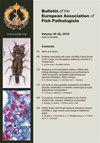Welfare of farmed fish: moral considerations, science, and problems of implementation
IF 1.1
4区 农林科学
Q4 FISHERIES
Bulletin of the European Association of Fish Pathologists
Pub Date : 2022-02-17
DOI:10.48045/001c.35754
引用次数: 0
Abstract
The question whether fish are worthy of moral consideration, and thus, can be included in humanity’s expanding moral circle, was first raised in the 1990s. After the turn of the millennium, “fish welfare” was used by more and more scientists in the field of aquaculture, animal advocates, politicians, legislators, the fish farming industry, and consumers (Kristiansen and Bracke, 2020). For several years, the widespread view amongst the scientific community was that welfare was intimately connected with the absence of stress and disease. There is no doubt that, stress, health, and welfare are strongly interrelated, but not in a simplistic manner. Stress response is an essential, genetically embedded, adaptive mechanism designed to secure survival and other critical biological functions. Therefore, it is crucial to determine, in a species- and life-stage specific way, at what point do we cross the red line that stress does impair fish welfare. We should also characterise allostatic load and overload, as well as coping styles and behavioural traits, over time and across situations, leading to differential stress response among proactive and reactive individuals. This is important as due to different gene x environmental interactions a given individual may show a different response following exposure to a stressor of the same nature, duration, and intensity, based on its cognitive capacity, cognitive ability and appraisal of the controllability and predictability of the situation or challenge (Korte et al., 2007).养殖鱼类的福利:道德考虑、科学和实施问题
20世纪90年代,人们首次提出了鱼类是否值得道德考虑,从而是否可以被纳入人类不断扩大的道德圈的问题。千禧年之交后,越来越多的科学家、动物倡导者、政治家、立法者、养鱼业和消费者使用“鱼类福利”(Kristiansen和Bracke,2020)。几年来,科学界普遍认为福利与没有压力和疾病密切相关。毫无疑问,压力、健康和福利是密切相关的,但不是简单的。应激反应是一种重要的、基因嵌入的适应性机制,旨在确保生存和其他关键的生物功能。因此,至关重要的是,以一种特定于物种和生命阶段的方式,确定我们在什么时候越过压力确实会损害鱼类福利的红线。我们还应该描述随着时间的推移和不同情况下的非静态负荷和超负荷,以及应对方式和行为特征,从而导致积极主动和被动个体的压力反应不同。这一点很重要,因为由于基因与环境的相互作用不同,特定个体在暴露于相同性质、持续时间和强度的压力源后,可能会表现出不同的反应,这取决于其认知能力、认知能力以及对情况或挑战的可控性和可预测性的评估(Korte等人,2007)。
本文章由计算机程序翻译,如有差异,请以英文原文为准。
求助全文
约1分钟内获得全文
求助全文
来源期刊
CiteScore
1.20
自引率
0.00%
发文量
19
审稿时长
>12 weeks
期刊介绍:
The Bulletin of the EAFP is an international peer-reviewed journal that publishes concise papers which merit rapid publication by virtue of their interest in the field of fish and shellfish pathology. Preliminary observations or partial studies are also acceptable, if adequately supported by experimental details. Short reviews, methodology papers and papers proposing alternative hypotheses based on previous data can be considered.

 求助内容:
求助内容: 应助结果提醒方式:
应助结果提醒方式:


